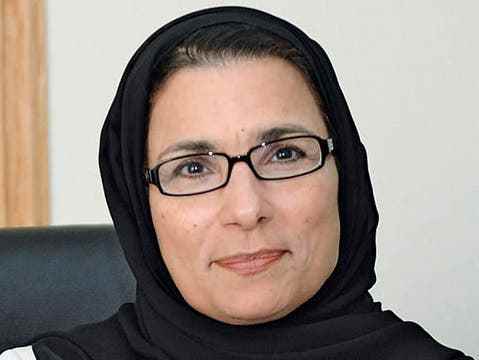Before the World Cup in Qatar, there is also a lot of talk about the rights of women in the emirate. In an interview, former university president Sheikha Abdulla al-Misnad explains why education is so important and why she doesn’t envy women in the West.
People walk by in front of the skyline in Doha on April 7, 2012.
Ms. Misnad, how have the preparations for the World Cup, which begins in Qatar on November 20, changed your country?
Above all, the event changes the view of other countries on Qatar. People come here and see that we are completely normal. The World Cup is important for the entire Arab world. In this way we can show: We are not only a war zone, there are not only problems, poverty and uprisings. Things work out here too.
However, Qatar’s image has also suffered. For example because of all the construction workers who died on the World Cup construction sites.
The media exaggerate. The workers came here voluntarily, nobody forced them. Most businesses in Qatar comply with the law. Of course there were exceptions, of course there was abuse. But labor law is now strict: there is a minimum wage, employers have to pay wages on time and provide accommodation for employees. Anyone who doesn’t do this will be punished. The World Cup helped us as a country in that sense.
To person

Sheikha Abdulla al-Misnad
The 69-year-old went to the UK in the 1970s to write a doctoral thesis on the education of women in the Gulf States. The topic remained important to her when she later worked at the Ministry of Education for the reform of the education sector and worked at Qatar University. In 2003 she became the first woman to be appointed president of the university and held this post until 2015.
Schools for girls in Qatar used to be inaccessible. A lot has changed in the meantime. Why?
Sheikha Moza, the former Emir’s wife, was a very important figure in this process. She was the first wife of an emir to appear in public. She is a role model for many women: suddenly they dared to become a minister or ambassador or to found a company.
They worked in the Ministry of Education and at the University of Qatar. What was your job?
The main aim was to make the university more modern. When it was founded in 1973 we had no experience with it, there was none before. In the 1990s, the government decided that we should improve the quality of education: not just memorize things, but analyze texts, develop an attitude and think critically.
You became President of Qatar University in 2003, the first woman to do so.
At that time, the Emir had a reform plan for the university. He wanted to improve the quality of education. I should examine and implement the ideas. It was very interesting for me, I could really change something. For example, we introduced an admissions process and standardized exams. Now there are a lot of universities in Qatar and the schools are free, at all levels from kindergarten to doctorate.
More women than men study in Qatar today.
Our problem now is: How do we motivate the young men? They’ve gotten a little lazy about having everything, but they shouldn’t take that for granted. Women, on the other hand, work hard and achieve a lot. When I was at Durham University in England, they always asked me: are women allowed to study at your university? I said: You have six women studying chemistry here – and only one of them is British. The English always had so many stereotypes in their heads and no longer saw the problems in themselves.
Where do these stereotypes come from?
Unfortunately, there are still Arab countries where girls are not allowed to go to school and women are not allowed to work.
Women in Qatar must also cover themselves.
That’s not true. My daughter, she’s 30, lives in Doha and doesn’t cover her hair – except in certain public places because she feels more comfortable with a headscarf there. She is an independent woman. At the age of 17 she went to America to study. When I compare her life with that of her grandmother, I see how quickly everything changes here: My mother got married at 13, she never went to school and never learned to read or write.
There is still a law that says women have to ask their father or husband if they want to travel.
I have never experienced that. But there are certainly fathers who are very traditional and do not allow their daughters to leave the country. And if they allow it, then only when accompanied by a male family member. My daughter travels alone, nobody has ever forbidden her to do so.
Nevertheless, the mere fact that women have to ask and men don’t is discriminatory.
Sure, that’s how it is. How the fathers decide is their private affair, we cannot force them to do anything. That will change over time. It’s important to give people their personal freedom and not to get too involved.
At the expense of women’s rights? The state could simply outlaw the discrimination.
But how? Imagine a father forbids his daughter to travel. Then the government should come and say that’s not possible? It is very delicate to break into the family. And what do we do if the girls don’t want to travel at all? Or don’t want to contradict her father?
The family has a high status in society.
Yes, and that’s a good thing. Sure, sometimes the family restricts women and men in their freedom. At the same time, the relatives support each other, the family is a place of security. In the west everyone has to make their own friends, clubs and groups to belong to. We do not need that. The family accepts me as I am, they know me, my strengths and weaknesses, I feel cared for. We don’t want to get lonely like you in the west.
What do you mean?
When I travel, I notice how many old people in Europe or the USA are alone. Nobody visits them or takes care of them. I see the loneliness in the people on the streets.
Distancing yourself from family means living your own life and breaking free from the expectations of others.
I understand that. Of course, you can also do without the advantages of the family in Qatar and live more independently. There are also women here who have their own apartment.
Where do you see the difficulties for these women?
All over the world women are caught up in ideas. They behave as they think society expects them to behave. It’s not easy for women to even figure out what they want. Do I just want to work because all my girlfriends do? Or care more about the family? I think mothers should pay attention to children first. If you neglect them, you cannot be successful in your job either.
But being a good mother doesn’t mean the same thing for every woman. If a woman likes to work . . .
. . . then she shouldn’t have children.
That sounds conservative.
I think most women want a child. Only very few decide against it voluntarily. If a woman is focused on work and has children, they will be neglected. The mothers should raise them to be considerate people and take care of them.
Would you say the same about fathers?
Yes. Today there are more couples who want to live as equals and share responsibility. Our society is changing rapidly, it is very international. We are not a backward, isolated desert community.
Qatar is an autocratic country, the Emir’s family is in total control.
Let’s call it a system of responsible leadership. We don’t have politicians who keep promising something in order to get elected and then fail to keep those promises. I think it’s important that people can express their opinions – but does it need a democracy for that? I don’t know it.
What does responsible leadership mean?
To govern a country in such a way that the people can live in prosperity and be content. There are many countries that have oil, yet the population remained poor – and the politicians just kept everything to themselves. It’s different in Qatar. The rulers are trying to create a modern, fair, safe country. Why should we change our system to one where politicians are constantly arguing with each other?
